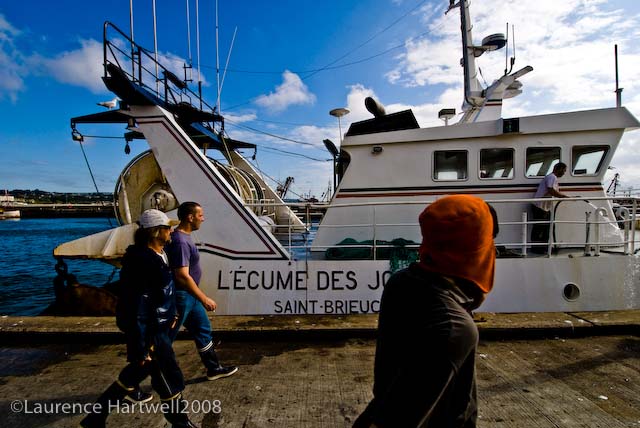"A Brexit without agreement for fishermen, it will be a real disaster. We are on the verge of a war in the Channel," said Alain Coudray, chairman of the Côtes-d'Armor fisheries committee, in his office lined with 'a huge map of the Breton coast. Their worst fear: a hard Brexit, without agreement with the United Kingdom, which would prohibit access to British waters overnight. "It would be a cataclysm," recognizes Olivier Le Nezet, president of the Breton fisheries committee.
An important part of Breton fishing
Fish caught in British waters, "it is 30% of sales under auction in Brittany" , itself the first French region for fishing, according to Jacques Doudet, secretary general of the regional fisheries committee.
"One hundred and twenty vessels fish for at least part of the year in British waters," he said.

Among the first concerned, are the deep-sea vessels, which fish offshore. "We have the impression of being forgotten about Brexit," says Dominique Thomas, owner of the Ecume des Jours, a 21m boat that fishes 90% in British waters, the English Channel and the Celtic Sea. Its crew delivers monkfish, rays or haddock every Wednesday at the port of Roscoff (Finistère). If British waters are prohibited, "we will end up with the Belgians and the Dutch in the West Channel and we will no longer have enough space, there will be more cohabitation" , he warns. "There will be accidents with cargo vessels and the resource will be destroyed by overfishing. "
Domino effect
His fear is also that all fishermen will find themselves ultimately penalized by Brexit, via a domino effect which would see the deep-sea fishers approaching the coasts and encroach on the fishing grounds of their colleagues.
"It's going to be a war between netter, potter and trawler," says Dominique Thomas. "We're going to come and get their bread."
Brittany has around 5,000 fishermen for more than 1,200 boats. And six of the ten largest French fishing ports are Breton, according to a ranking by the Union of French ports. The port of Lorient is in N° 1, both in terms of turnover and tonnage of fish sold at auction.
Temporary work stoppages, financed by European funds, are planned in the event of a hard Brexit. "They would pay us 70% of our 2017 turnover to stay ashore," explains Dominique Thomas. "But you don't buy a boat to stay in the basin. And then, it is more damaged by staying along the quay than at sea".
Such a stop would also risk penalizing the entire industry, from shipbuilding to repairing boats, including fish processing. "It is estimated that one job at sea corresponds to four jobs on land. Boats at the quay are sailors who go to look elsewhere, less naval repair, fishmongers who have no more fish to buy" , underlines Pierre Karleskind, vice-president (LREM) of the regional council.
In the fishing, processing and marketing sector alone, there are 16,570 jobs in Brittany , according to the regional observatory for the maritime economy.
Even a Brexit with agreement would not settle anything, because the issue of fishing was left to further negotiations. "Seeing the treated fishery aside, that worries us. At the end of the day, the negotiators will be exhausted and the British will not give up , " said Jacques Doudet. A context that could cause strong social tensions, according to some. "We are not the yellow vests, we are not the black blocks but we know how to do it," warns Alain Coudray. "If the CRS are equipped, so are we."
*Translated by Google